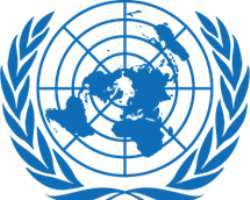7.1 million People Need Life-Saving Humanitarian Assistance... UN OCHA

Ending a five-day visit, senior officials from United Nations humanitarian agencies and NGOs stressed that the humanitarian crisis in Borno, Adamawa and Yobe States in Nigeria’s north-east needs renewed support to face the recent upsurge in violence and growing humanitarian needs.
A statement issued by Mr. K. Abiodun, Communication Officer, UN OCHA Weekend said during the mission, the senior officials met with the Ministry of Budget and National Planning, the Executive Governor of Borno State, as well as a wide range of UN agencies, humanitarian NGOs and partners in Maiduguri, the Borno State capital.
They also visited several camps for internally displaced persons in Maiduguri and some of the towns most affected by the crisis in Borno State: Damboa, Dikwa, and Rann.
“The crisis in the Lake Chad Region is far from over. The humanitarian community cannot spare any effort at this time,” Mr. Vincent Houver from the International Organization of Migration, one of the mission members.
“This week we have met with women, children, and men who have been forced to flee multiple times and urgently need protection and assistance to survive and rebuild their lives. We cannot let them down.”
Now in its tenth year, the conflict continues to uproot the lives of tens of thousands of civilians. In recent months, a new spike in violence and military counter-operations have affected civilians in the BAY states, particularly in Borno State.
Since January, some 134,000 people have been forced from their homes. In total, 7.1 million people need life-saving humanitarian assistance across the states of Borno, Adamawa and Yobe.
Their livelihoods have been affected by violence, deepening chronic vulnerabilities – food insecurity, malnutrition and epidemics. Nearly 3 million people face food insecurity and malnutrition is threatening more than one million children.
“Aid agencies have significantly scaled up and reached some two million people with aid this year,” explained the Humanitarian Coordinator in Nigeria, Mr. Edward Kallon. “However, much more support is urgently needed. We are worried about the tens of thousands of people who have recently fled rising violence and are still sleeping outside in the open. With the rainy season progressing, they will face increased risk of diseases and need immediate protection.”
“Some of the people we met have been living in camps for internally displaced persons for several years.” explained Mr. Christian Gad, Head of Emergencies for the Danish Refugee Council. “All actors, including the Government and the private sector in Nigeria, need to join forces to help those affected by the crisis recover, in dignity, and restart their lives.”
The United Nations and its partners have appealed for $848 million to be able to provide urgent, life-saving assistance to 6.2 million people in 2019. Six months into the year, and thanks to the generosity of donors, the response plan is 32.6 per cent funded. More funding is urgently needed to sustain the humanitarian response.
Ms. Reena Ghelani, the Director of the Operations and Advocacy Division for the United Nations Office for the Coordination of Humanitarian Affairs, led a delegation of emergency directors including Ms. Sheila Grudem (Deputy Director Emergency Preparedness and Response Support Division, World Food Programme),.
Others include Mr. Christian Gad (Head of Emergencies, Danish Refugee Council), Mr. Vincent Houver (Deputy Director, Department of Operations and Emergencies, International Organization for Migration), Mr. José Barahona, (Emergency Response Director, Norwegian Refugee Council), Mr. Andrew Mbogori (Principal Emergency Coordinator, Division of Emergency Services, Office of the United Nations High Commissioner for Refugees), and Dr. Renee Van de Weerdt (Acting Director Emergency Operations, World Health Organization).
